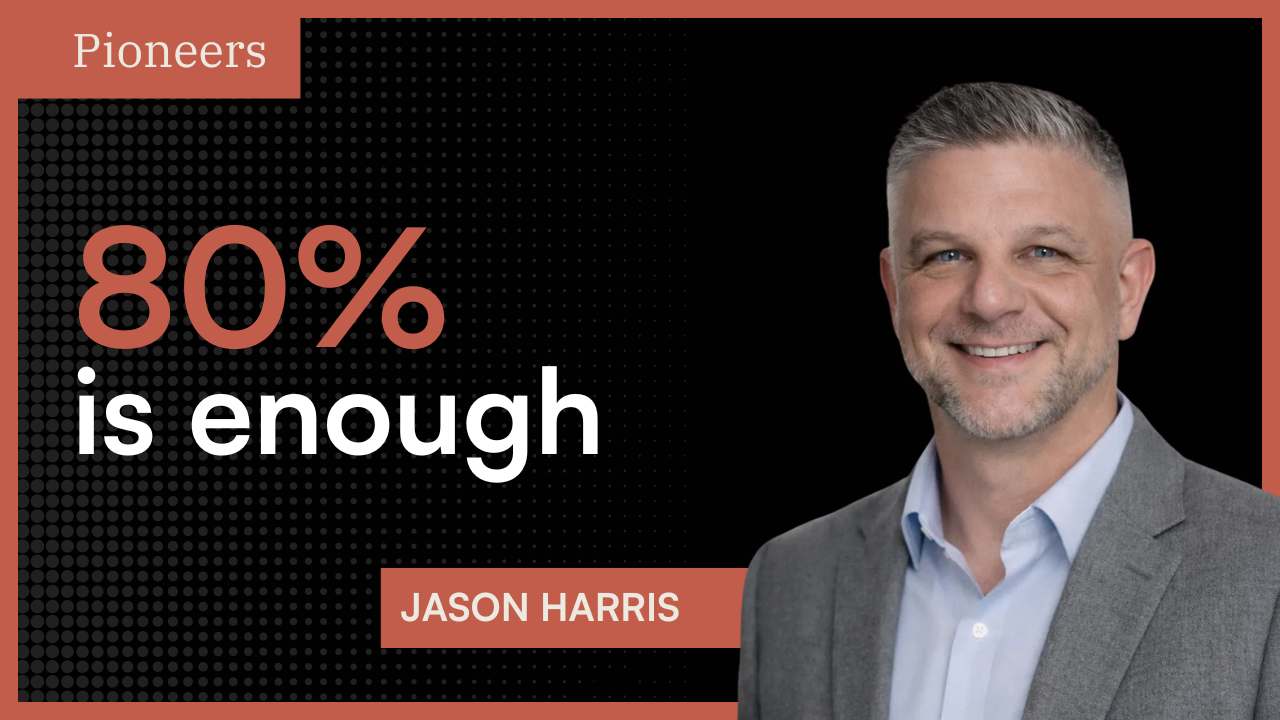This is a summary of an episode of Pioneers, an educational podcast on AI led by our founder. Join 2,000+ business leaders and AI enthusiasts and be the first to know when new episodes go live. Subscribe to our newsletter here.
TL;DR
- Alok Chaudhary emphasizes the importance of managing unstructured healthcare data, which makes up 70-80% of all data, to improve patient outcomes and operational efficiency.
- AI-driven tools are helping healthcare providers address challenges like data collection and security, patient privacy, and regulatory compliance while working with diverse data formats.
- Integrating AI into clinical workflows aims to provide clinicians with real-time insights, enhance decision-making, and reduce the complexity of managing patient histories.
- AI solutions are being used to improve billing and coding accuracy, reducing errors and helping prevent insurance claim denials.
- Chaudhary highlights the potential of AI in creating "patient 360" views by integrating data from multiple sources, helping to personalize care and improve patient management.
Before we dive into the key takeaways from this episode, be sure to catch the full episode here:
Meet Alok - Chief Data and AI Officer at VCU Health
Alok Chaudhary is a seasoned healthcare leader with over two decades of experience in data and AI. He began his career as a programmer and quickly transitioned into leadership roles, focusing on the intersection of technology and healthcare operations.
As the inaugural Chief Data and AI Officer at VCU Health, Alok is driving efforts to modernize healthcare by leveraging AI to improve data usage, management, security, and clinical decision-making.
He is deeply involved in addressing the challenges of integrating unstructured data and enhancing patient care through innovative AI solutions.
Known for his expertise in both data strategy and healthcare, Alok's leadership is focused on creating impactful, data-driven systems that streamline operations while ensuring regulatory compliance and patient privacy.
The Role of AI in Managing Unstructured Healthcare Data
In the podcast, Alok Chaudhary highlights the critical role of AI in managing unstructured healthcare data, which comprises 70-80% of the data generated in the industry.
Unstructured data in healthcare includes, for example:
- clinical notes
- radiology reports
- patient histories
These are often stored in various formats across different systems. This data is essential but challenging to utilize effectively because it lacks a standardized structure, making it difficult to analyze and integrate into clinical workflows.
AI-powered tools, like Unstructured AI, are integral to data life cycle management in healthcare, turning unstructured data into structured, actionable insights. This ensures that unstructured data collected is processed, and utilized efficiently for better clinical outcomes.
For instance, Unstructured AI can extract key information from clinical notes or diagnostic reports and present it in a format that is easily accessible to healthcare providers but also adjusted for RAG architectures.
This helps clinicians obtain a holistic view of the patient’s health and make better decisions, as well as improves internally used AI solutions.
The Importance of DLM in Healthcare
Alok Chaudhary emphasizes the importance of data lifecycle management (DLM) in healthcare, especially when dealing with unstructured data. Proper data lifecycle management helps healthcare systems meet both technical and regulatory challenges while ensuring data protection and operational efficiency.
With the right AI tools, healthcare organizations can improve data governance and security while complying with regulations like HIPAA. In the long term, these advancements will not only streamline operations but also enhance the quality of patient care by ensuring that the right information is available at the right time.
Improving Patient Care with AI-Powered Clinical Decision Support
Alok notes that integrating AI into clinical workflows can provide clinicians with real-time insights derived from vast amounts of patient data, enabling more informed decision-making.

This is especially crucial in healthcare, where timely access to accurate information can significantly impact patient outcomes.
AI can analyze patient histories, vital signs, and diagnostic results, helping clinicians quickly identify trends and anomalies that might otherwise go unnoticed.
For example, AI can summarize complex patient data, making it easier for healthcare providers to grasp essential information before consultations. This is particularly important in scenarios where clinicians have limited time to prepare for patient interactions.
Alok also highlights the importance of ensuring that AI solutions are reliable and safe, given the sensitive nature of healthcare.
The goal is to create assistive technologies that complement clinicians' expertise, enabling them to adhere to established protocols and best practices.
Effective organizational data management is crucial for healthcare, as it improves the quality of care, reduces the risk of errors, and enhances overall patient experiences. AI-driven data management processes ensure accurate handling of patient data at every touchpoint.
Addressing Data Privacy and Security Challenges in Healthcare AI
Maintaining data security is paramount in healthcare. Given the sensitive nature of patient data, which must comply with regulations like HIPAA, maintaining data security is paramount.
Alok emphasizes that healthcare operates in a highly regulated environment where patient privacy is a top priority:
- Throughout the data lifecycle, AI solutions must be designed with stringent security measures to ensure that data access of sensitive information is strictly on a need-to-know basis.
- This includes implementing robust data governance practices to protect against unauthorized access and breaches.
- In healthcare, effective data storage solutions are vital to managing both structured and unstructured data. Cloud-based technologies provide scalable data storage options while ensuring compliance with stringent data governance standards.
Alok also highlights the need for organizations to leverage existing technologies and cloud-based solutions to address these challenges. By employing advanced AI tools that focus on data security and compliance, healthcare institutions can enhance their ability to protect patient information while still utilizing data to improve care delivery.
“Data privacy and security are paramount; we must safeguard sensitive patient information in an increasingly digital world.” — Alok Chaudhary
The successful integration of AI in healthcare not only depends on innovative technology but also on robust security frameworks that prioritize patient trust and regulatory adherence.
AI’s Impact on Healthcare Billing and Reducing Insurance Claim Denials
Both Ankur and Alok agree that many billing issues stem from incomplete or incorrect coding, which can lead to avoidable costs for healthcare providers.
AI can play a crucial role in addressing these challenges by improving the accuracy of coding and billing practices.
By analyzing clinical notes and other unstructured data, AI can extract essential information to ensure that charges reflect the services provided accurately.
This level of detail helps prevent errors that could result in denied claims. Alok points out that AI solutions can streamline the billing process by automatically identifying missing or inconsistent data, enabling coders to rectify issues before submission.
Moreover, AI can facilitate better communication between providers and payers, improving the overall efficiency of the claims process.
By creating direct connections and prompt data sharing, AI can help ensure that payers receive accurate information within mandated timeframes, further reducing the likelihood of claim denials.
Ultimately, these advancements not only save time and resources for healthcare organizations but also enhance the financial health of the system by minimizing revenue loss due to billing errors.
The Creation of “Patient 360” Views for Personalized Care
During our podcast discussion, Alok Chaudhary emphasized the importance of creating "Patient 360" views to enhance personalized care.
This approach involves integrating data from various sources, including electronic health records (EHRs), lab results, and imaging systems, to provide a comprehensive overview of a patient's health.
By leveraging AI, healthcare providers can collate and analyze this diverse data, enabling clinicians to access a holistic profile of each patient.
Through data creation and sharing across multiple systems, healthcare providers can create a comprehensive view of patient histories, allowing for more personalized treatment plans. Data sharing ensures that clinicians have access to the right information at the right time, optimizing patient care.
Alok highlights that achieving this integration is vital for better decision-making and personalized patient outcomes.
Navigating the Complexities of AI Integration in Healthcare Systems
Alok notes that while the potential for AI to enhance healthcare operations is significant, the actual implementation can be challenging due to the existing infrastructure.
Many healthcare organizations rely on legacy systems that may not easily accommodate new technologies, creating barriers to effective integration.
“EHRs are intended to streamline workflows, but many clinicians still find them cumbersome and challenging to use.” — Ankur Patel
During the podcast, he also emphasizes the need for interoperability among various data sources and platforms, highlighting that healthcare data often exists in disparate systems. This fragmentation complicates the process of consolidating information and leveraging AI effectively.
Chaudhary also points out the importance of aligning AI initiatives with clinical workflows to ensure that the technology adds value without increasing the burden on healthcare providers.
Ensuring data quality, security, and compliance with regulations like HIPAA is essential to protect patient information and maintain trust.
By carefully navigating these challenges and fostering collaboration between IT and clinical teams, healthcare organizations can create a robust framework for AI integration. This approach ultimately leads to improved operational efficiency, enhanced patient care, and more effective use of healthcare data.
AI as an Assistive Technology in Healthcare: Beyond Automation
Alok Chaudhary discussed the role of AI as an assistive technology in healthcare, emphasizing its potential to enhance rather than replace human expertise.
“AI’s role is not just automation, it’s an assistive technology that complements clinician expertise.” — Alok Chaudhary
He points out that AI can streamline administrative tasks, allowing clinicians to focus more on patient care.
For instance, AI tools can assist in scribing during patient visits, capturing conversations without disrupting the interaction between the clinician and the patient.
Additionally, Alok notes that AI can analyze unstructured data assets from clinical notes and other sources, providing actionable insights that support clinical decision-making. This capability helps clinicians adhere to established protocols and best practices, ultimately improving patient outcomes.
By acting as a supportive resource, AI fosters a collaborative environment where technology complements the skills and knowledge of healthcare professionals, leading to a more efficient and effective healthcare delivery system.
Want to learn more about AI in healthcare? Check out this episode on AI-Powered Health Assessments with Vanessa Lemarie, COO of Ada Health.
.svg)





.svg)
.svg)

.svg)
.png)


